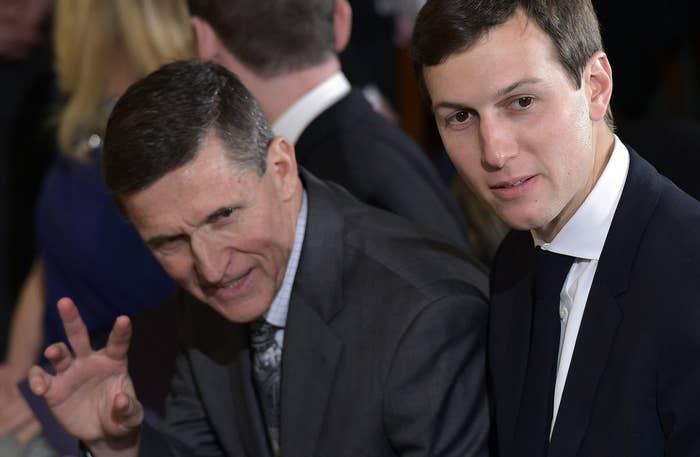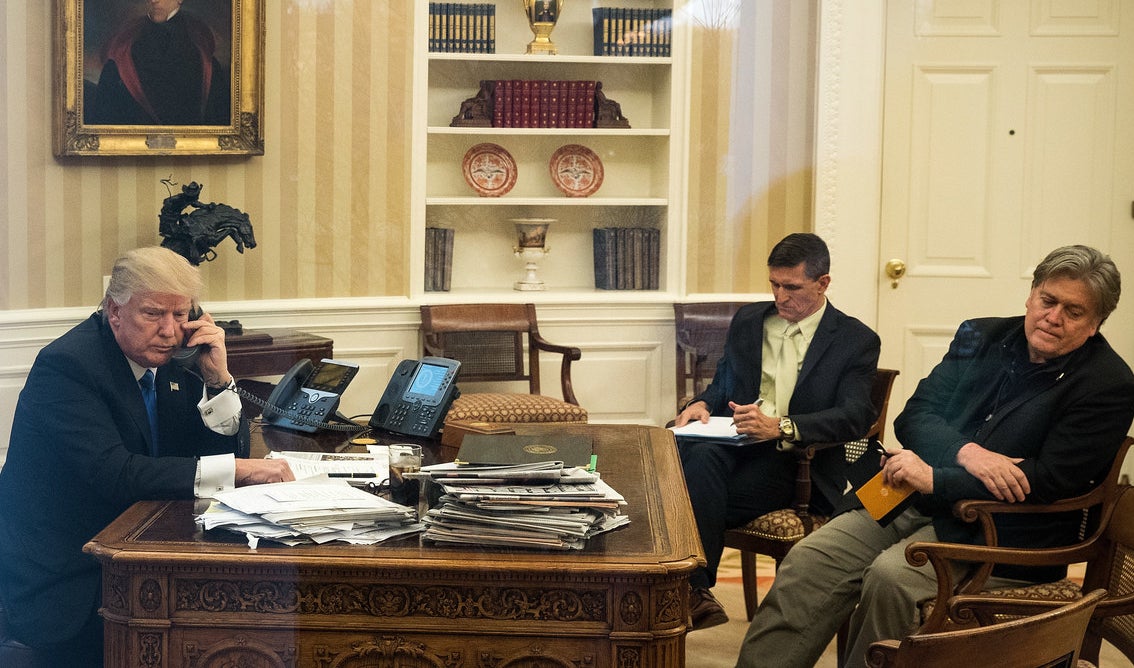
In the days leading up to Donald Trump’s presidential inauguration, when his soon-to-be national security adviser Michael Flynn was reportedly pushing a multibillion-dollar deal to build nuclear reactors in Jordan and other Middle East nations, Flynn and two other top Trump advisers held a secret meeting with the king of Jordan.
The meeting — details of which have never been reported — is the latest in a series of secret, high-stakes contacts between Trump advisers and foreign governments that have raised concerns about how, in particular, Flynn and senior adviser Jared Kushner handled their personal business interests as they entered key positions of power. And the nuclear project raised additional security concerns about expanding nuclear technology in a tinderbox region of the world. One expert compared it to providing “a nuclear weapons starter kit.”
On the morning of Jan. 5, Flynn, Kushner, and former chief strategist Steve Bannon greeted King Abdullah II at the Four Seasons hotel in lower Manhattan, then took off in a fleet of SUVs and a sedan to a different location.
People close to the three Trump advisers say that the nuclear deal was not discussed. But a federal official with access to a document created by a law enforcement agency about the meeting said that the nuclear proposal, known as the Marshall Plan, was one of the topics the group talked about.
The Wall Street Journal reported that while Flynn’s White House disclosure forms state that he stopped working on the deal in December 2016, he in fact continued to push it even after he entered the White House. Flynn’s lawyer declined to comment on the claims in the Journal story.
Got a tip? You can email tips@buzzfeed.com.
To learn how to reach us securely, go to tips.buzzfeed.com
The plan, for which Flynn was reportedly paid as a consultant, initially envisioned that the reactors would be built by US companies and security would be provided by the Russian state-owned firm Rosoboron, an arms exporter currently facing US sanctions. As the plan evolved, Russian involvement reportedly lessened, and it is not known whether Russia or its companies featured in the meeting with the Jordanian king. This week, Democratic members of the House Oversight Committee said they would turn over documents about the nuclear plan to Special Counsel Robert Mueller, contending that Flynn may have violated federal law by not disclosing foreign trips and meetings.
While it is not unusual for an incoming administration to meet with foreign dignitaries during the transition, Trump surrogates have repeatedly failed to acknowledge these contacts. Attorney General Jeff Sessions at first said he did not discuss campaign matters with Russian officials, only to later acknowledge at least two conversations with Russian Ambassador Sergey Kislyak. The United Arab Emirates set up a meeting between a military contractor close to the Trump administration and a Russian close to President Vladimir Putin. And this week, CNN reported that Abu Dhabi’s crown prince, Sheikh Mohammed bin Zayed al-Nahyan, visited with Flynn, Kushner, and Bannon without alerting the American government beforehand.
The meeting with the king of Jordan had extremely high stakes: a discussion with the head of a key American ally that might have included plans about spreading nuclear power to one of the world's least stable regions, possibly with the help of one of America's main geopolitical enemies, Russia. The revelation of the meeting comes as Abdullah plans to visit the United States next week and speak with Trump.
An eyewitness who saw the trio of Trump’s advisers that morning in the bar of the Four Seasons, and had a brief exchange with Bannon, said at least half a dozen other people were with them. It is not clear who they were. BuzzFeed News reached out to attorneys and spokespeople for Flynn, Kushner, and Bannon, as well as White House special counsel Ty Cobb and Bannon himself. None of them would comment on the record.
The only known public acknowledgement that Abdullah had left his country is a short note on his website saying: “His Majesty King Abdullah on Saturday arrived back home after a private visit abroad.”
Officials at the Jordanian embassy did not return multiple calls seeking comment.
Kushner initially failed to disclose any meetings with foreign officials on his security clearance form. He later amended the document to include more than 100 foreign contacts, including Abdullah.
In a statement sent to congressional committees in July, Kushner wrote that an assistant inadvertently had sent the security clearance form before it was finished and that Kushner “made every effort to provide the FBI with whatever information is needed to investigate my background.”
Flynn applied for a new security clearance in January 2016, and lawmakers said he failed to note “even a single foreign government official he had contact with in the seven years prior to submitting his security clearance application.” It is not known what foreign contacts Bannon noted on his clearance forms because the White House has not released them.
Three individuals — one close to Flynn, a second close to Kushner, and a third close to Bannon — denied that the nuclear deal came up in the meeting with the Jordanian king. But the source familiar with the law enforcement document said participants talked about Israeli-Palestinian relations, intelligence sharing between America and Jordan on Syria, ISIS — and the nuclear proposal.
The nuclear project may have been the most controversial subject. Newsweek first reported that Flynn tried to broker the deal, which promised “up to $200 billion in U.S. nuclear export opportunities” and “a new expanded security relationship." Politico reported that he was paid at least $25,000 by one of the American companies involved in the project, the now-defunct X-Co Dynamics/Iron Bridge Group. Representatives of that company did not respond to messages requesting comment.

Nuclear plants were to be built in Jordan, Saudia Arabia, and three other countries in the region. In April of last year, the head of Jordan’s design and development bureau, Maj. Gen. Omar Al Khaldi, was copied on emails saying the plan was designed to solidify the region “under a security construct” that would be led “by two superpowers.” The emails were released by the Democratic lawmakers on the House Oversight Committee.
In order for such a nuclear plan to move forward, Congress would have to ratify a deal similar to ones signed in recent years with India and the United Arab Emirates. Known as a “123 Agreement” — named for a section of the United States Atomic Energy Act — it requires countries sharing American nuclear technology and fuel to take steps to prevent them from being used in weapons.
The US has similar agreements in place with two other Arab nations, Egypt and Morocco.
Proponents have said the plan could bring new security to the region, by bringing disparate countries together in a shared project under American guidance. But critics believe the deal could provide nations that do not currently have nuclear weapons with the raw materials to make them.
“Any proposal to introduce dozens of nuclear reactors to the Middle East, particularly Saudi Arabia, raises many proliferation red flags,” said Daryl Kimball, executive director of the nonpartisan Arms Control Association. “The Saudis do not need nuclear power and them gaining access could lead to dangerous consequences down the road.”
“The reason there is concern is that nuclear energy capacity is like giving a country a nuclear weapons starter kit,” said Alexandra Bell, senior policy director at the nonprofit Center for Arms Control and Non-Proliferation.
In the original proposal, American companies would have joined a consortium including the Saudi government and Russia to build 40 nuclear power plants in the region. The deal ultimately fizzled.
Shortly after Trump took office, the White House publicly announced a visit by Abdullah. The February visit included meetings with John Kelly, then the secretary of Homeland Security, and Defense Secretary Jim Mattis. In a statement summarizing Trump’s meeting with Abdullah, the White House said, “President Trump underscored that the United States is committed to strengthening the security and economic partnership with Jordan.”
Got a tip? You can email tips@buzzfeed.com.To learn how to reach us securely, go to tips.buzzfeed.com


